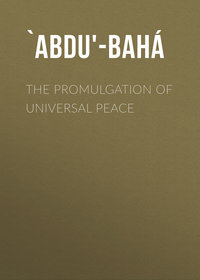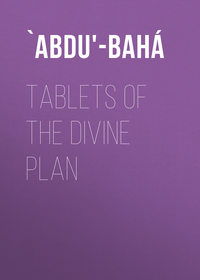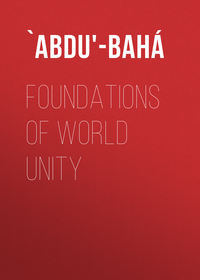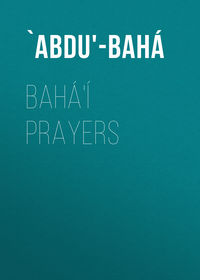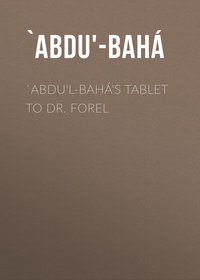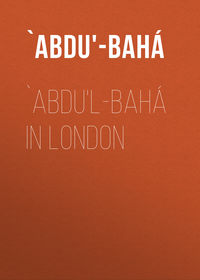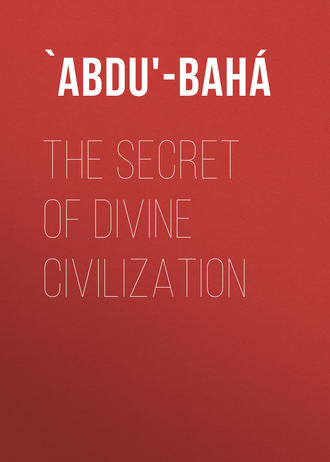 полная версия
полная версияThe Secret of Divine Civilization
Observe to what a degree the lack of education will weaken and degrade a people. Today [1875] from the standpoint of population the greatest nation in the world is China, which has something over four hundred million inhabitants. On this account, its government should be the most distinguished on earth, its people the most acclaimed. And yet on the contrary, because of its lack of education in cultural and material civilization, it is the feeblest and the most helpless of all weak nations. Not long ago, a small contingent of English and French troops went to war with China and defeated that country so decisively that they took over its capital Peking. Had the Chinese government and people been abreast of the advanced sciences of the day, had they been skilled in the arts of civilization, then if all the nations on earth had marched against them the attack would still have failed, and the attackers would have returned defeated whence they had come.
Stranger even than this episode is the fact that the government of Japan was in the beginning subject to and under the protection of China, and that now for some years, Japan has opened its eyes and adopted the techniques of contemporary progress and civilization, promoting sciences and industries of use to the public, and striving to the utmost of their power and competence until public opinion was focused on reform. This government has currently advanced to such a point that, although its population is only one-sixth, or even one-tenth, that of China, it has recently challenged the latter government, and China has finally been forced to come to terms. Observe carefully how education and the arts of civilization bring honor, prosperity, independence and freedom to a government and its people.
It is, furthermore, a vital necessity to establish schools throughout Persia, even in the smallest country towns and villages, and to encourage the people in every possible way to have their children learn to read and write. If necessary, education should even be made compulsory. Until the nerves and arteries of the nation stir into life, every measure that is attempted will prove vain; for the people are as the human body, and determination and the will to struggle are as the soul, and a soulless body does not move. This dynamic power is present to a superlative degree in the very nature of the Persian people, and the spread of education will release it.
As to that element who believe that it is neither necessary nor appropriate to borrow the principles of civilization, the fundamentals of progress toward high levels of social happiness in the material world, the laws which effect thorough reforms, the methods which extend the scope of culture—and that it is far more suitable that Persia and the Persians reflect over the situation and then create their own techniques of progress.
It is certain that if the vigorous intelligence and superior skill of the nation’s great, and the energy and resolve of the most eminent men at the imperial court, and the determined efforts of those who have knowledge and capacity, and are well versed in the great laws of political life, should all be combined, and all should exert every effort and examine and reflect over every detail as well as on the main currents of affairs, there is every likelihood that because of the effective plans they would evolve, some situations would be thoroughly reformed. In the majority of cases, however, they would still be obliged to borrow; because, throughout the many-centuried past, hundreds of thousands of persons have devoted their entire lives to putting these things to the test until they were able to bring about these substantial developments. If all that is to be ignored and an effort is made to re-create those agencies in our own country and in our own way, and thus effect the hoped-for advancement, many generations would pass by and still the goal would not be reached. Observe for instance that in other countries they persevered over a long period until finally they discovered the power of steam and by means of it were enabled easily to perform the heavy tasks which were once beyond human strength. How many centuries it would take if we were to abandon the use of this power and instead strain every nerve to invent a substitute. It is therefore preferable to keep on with the use of steam and at the same time continuously to examine into the possibility of there being a far greater force available. One should regard the other technological advances, sciences, arts and political formulae of proven usefulness in the same light—i.e., those procedures which, down the ages, have time and again been put to the test and whose many uses and advantages have demonstrably resulted in the glory and greatness of the state, and the well-being and progress of the people. Should all these be abandoned, for no valid reason, and other methods of reform be attempted, by the time such reforms might eventuate, and their advantages might be put to proof, many years would go by, and many lives. Meanwhile, “we are still at the first bend in the road.”74
The superiority of the present in relation to the past consists in this, that the present can take over and adopt as a model many things which have been tried and tested and the great benefits of which have been demonstrated in the past, and that it can make its own new discoveries and by these augment its valuable inheritance. It is clear, then, that the accomplishment and experience of the past are known and available to the present, while the discoveries peculiar to the present were unknown to the past. This presupposes that the later generation is made up of persons of ability; otherwise, how many a later generation has lacked even so much as a drop out of the boundless ocean of knowledge that was its forbears’.
Reflect a little: let us suppose that, through the power of God, certain individuals are placed on earth; these obviously stand in need of many things, to provide for their human dignity, their happiness and ease. Now is it more practicable for them to acquire these things from their contemporaries, or should they, in each successive generation, borrow nothing, but instead independently create one or another of the instrumentalities which are necessary to human existence?
Should some maintain that those laws, principles and fundamentals of progress on the highest levels of a fully developed society, which are current in other countries, are not suited to the condition and the traditional needs of Persia’s people, and that on this account it is necessary that within Írán, the nations’ planners should exert their utmost efforts to bring about reforms appropriate to Persia—let them first explain what harm could come from such foreign importations.
If the country were built up, the roads repaired, the lot of the helpless improved by various means, the poor rehabilitated, the masses set on the path to progress, the avenues of public wealth increased, the scope of education widened, the government properly organized, and the free exercise of the individual’s rights, and the security of his person and property, his dignity and good name, assured—would all this be at odds with the character of the Persian people? Whatever is in conflict with these measures has already been proved injurious, in every country, and does not concern one locality more than another.
These superstitions result in their entirety from lack of wisdom and understanding, and insufficient observation and analysis. Indeed, the majority of the reactionaries and the procrastinators are only concealing their own selfish interests under a barrage of idle words, and confusing the minds of the helpless masses with public statements which bear no relation to their well-concealed objectives.
O people of Persia! The heart is a divine trust; cleanse it from the stain of self-love, adorn it with the coronal of pure intent, until the sacred honor, the abiding greatness of this illustrious nation may shine out like the true morning in an auspicious heaven. This handful of days on earth will slip away like shadows and be over. Strive then that God may shed His grace upon you, that you may leave a favorable remembrance in the hearts and on the lips of those to come. “And grant that I be spoken of with honor by posterity.”75
Happy the soul that shall forget his own good, and like the chosen ones of God, vie with his fellows in service to the good of all; until, strengthened by the blessings and perpetual confirmations of God, he shall be empowered to raise this mighty nation up to its ancient pinnacles of glory, and restore this withered land to sweet new life, and as a spiritual springtime, array those trees which are the lives of men with the fresh leaves, the blossoms and fruits of consecrated joy.
1
Qur’án 39:69.
2
Qur’án 55:1–3.
3
Qur’án 39:12.
4
Qur’án 41:53.
5
Qur’án 7:178; 8:22.
6
The original Persian text written in 1875 carried no author’s name, and the first English translation published in 1910 under the title The Mysterious Forces of Civilization states only “Written in Persian by an Eminent Bahai Philosopher.”
7
Qur’án 76:9.
8
2 Chronicles 36:22–23; Ezra 1:2; Esther 1:1; 8:9; Isaiah 45:1, 14; 49:12.
9
Qur’án 6:90; 11:31.
10
Qur’án 14:23; 35:18.
11
Qur’án 95:4.
12
The Imám ‘Alí.
13
Qur’án 5:85.
14
Qur’án 29:2.
15
Jáhilíyyih: the period of paganism in Arabia, prior to the advent of Muḥammad.
16
The pagan Arabs observed one separate and three consecutive months of truce, during which period pilgrimages were made to Mecca, and fairs, poetry contests and similar events took place.
17
Qur’án 16:124.
18
Qur’án 4:45; 5:16.
19
Cf. Bahá’u’lláh, The Kitáb-i-Íqán, p. 86.
20
“If by the word algebra we mean that branch of mathematics by which we learn how to solve the equation x2+5x=14, written in this way, the science begins in the 17th century. If we allow the equation to be written with other and less convenient symbols, it may be considered as beginning at least as early as the 3rd century. If we permit it to be stated in words and solved, for simple cases of positive roots, by the aid of geometric figures, the science was known to Euclid and others of the Alexandrian school as early as 300 B.C. If we permit of more or less scientific guessing in achieving a solution, algebra may be said to have been known nearly 2000 years B.C., and it had probably attracted the attention of the intellectual class much earlier… The name ‘algebra’ is quite fortuitous. When Mohammed ibn Músá al-Khowarizmí … wrote in Baghdad (c. 825) he gave to one of his works the name Al-jebr w’al-muqábalah. The title is sometimes translated as ‘restoration and equation,’ but the meaning was not clear even to the later Arab writers.” Encyclopedia Britannica, 1952, s.v. Algebra.
21
Qur’án 39:12; 13:17.
22
Rúmí, The Mathnaví, I, 1906–1907.
23
‘Ulamá, from the Arabic alima, to know, may be translated learned men, scientists, religious authorities.
24
The Resh Galuta, a prince or ruler of the exiles in Babylon, to whom Jews, wherever they were, paid tribute.
25
A measure of weight, in Ṭihrán equivalent to six and two-thirds pounds.
26
Qur’án 9:33; 48:28; 61:9.
27
Qur’án 54:55.
28
Qur’án 7:171: Yawm-i-Alast, the Day when God, addressing Adam’s posterity-to-be, said to them, “Am I not your Lord?” (a-lastu bi Rabbikum) and they replied: “Yea, we bear witness.”
29
Qur’án 9:33.
30
Cf. Qur’án 27:12, referring to Moses: “Put now thy hand into thy bosom: it shall come forth white … one of nine signs to Pharaoh and his people....” Also Qur’án 7:105; 20:23; 26:32; 32. Also Exodus 4:6. See too Edward Fitzgerald’s The Rubaiyat of Omar Khayyam:
Now the New Year reviving old Desires,The thoughtful Soul to Solitude retires,Where the White Hand of Moses on the BoughPuts out, and Jesus from the Ground suspires.The metaphors here refer to white blossoms and the perfumes of spring.
31
Qur’án 16:126.
32
Qur’án 24:35.
33
Dhu’l-Awtád is variously rendered by translators of the Qur’án as The Impaler, The Contriver of the Stakes, The Lord of a Strong Dominion, The One Surrounded by Ministers, etc. Awtád means pegs or tent stakes. See Qur’án 38:11 and 89:9.
34
Qur’án 20:46.
35
Qur’án 33:63: “Men will ask Thee of ‘the Hour.’ Say: The knowledge of it is with God alone.” Cf. also 22:1, “the earthquake of the Hour,” etc. See also Matthew 24:36, 42, etc. To Bahá’ís, this refers to the Advent of the Báb and Bahá’u’lláh.
36
Cf. the Islamic confession of faith, sometimes called the two testimonies: “I testify that there is no God but God and Muḥammad is the Prophet of God.”
37
Cf. Qur’án 27:20 ff.
38
Qur’án 12:44; 21:5.
39
Qur’án 24:39.
40
1875 A.D.
41
The foregoing paragraph, together with the later paragraph beginning “A few, unaware of the power latent in human endeavor,” was translated by Shoghi Effendi, Guardian of the Bahá’í Faith. Cf. The World Order of Bahá’u’lláh, pp. 37–38.
42
Sásáníyán king who reigned 531–578 A.D.
43
i.e., the whole world.
44
Sa’dí, The Gulistán, On the Conduct of Kings.
45
Qur’án 17:84.
46
The poet Saná’í.
47
Rúmí, The Mathnaví, III, 4229–4231.
48
Qur’án 2:24.
49
Qur’án 8:64.
50
See Rúmí, The Mathnaví, II, 185 and 189. Also the Hadíth: “God created the creatures in darkness, then He sprinkled some of His Light upon them. Those whom some of that Light reached took the right way, while those whom it missed wandered from the straight road.” Cf. R. A. Nicholson’s “The Mathnawí of Jalálu’ddín Rúmí” in the E. J. W. Gibb Memorial Series.
51
Qur’án 24:35.
52
Qur’án 2:58.
53
Qur’án 17:4 ff.
54
The King James Bible reads: “Ye have heard that it hath been said, Thou shalt love thy neighbour, and hate thine enemy.” Scholars object to this reading because it is contrary to the known Law as set forth in Leviticus 19:18, Exodus 23:4–5, Proverbs 25:21, the Talmud, etc.
55
Cf. ‘Abdu’l-Bahá, Some Answered Questions, ch. LXXXIV, and Promulgation of Universal Peace, p. 385. See also Galen on Jews and Christians by Richard Walzer, Oxford University Press, 1949, p. 15. The author states that Galen’s summary here referred to is lost, being preserved only in Arabic quotations.
56
From Qur’án 4:114; 2:207, etc
57
Qur’án 39:69.
58
The Persian text transliterates this author’s name as “Draybár” and titles his work The Progress of Peoples. The reference is apparently to John William Draper, 1811–1882, celebrated chemist and widely-translated historian. Detailed material on Muslim contributions to the West, and on Gerbert (Pope Sylvester II) appears in the second volume of the work cited. Of some of Europe’s systematically unacknowledged obligations to Islám the author writes: “Injustice founded on religious rancour and national conceit cannot be perpetuated for ever.” (Vol. II, p. 42, Rev. ed.) The Dictionary of American Biography states that Draper’s father was a Roman Catholic who assumed the name John Christopher Draper when disowned by his family for becoming a Methodist, and that his real name is unknown. The translator is indebted to Mr. Paul North Rice, Chief of the New York Public Library’s Reference Department, for the information that available data on Draper’s family history and nationality are in conflict; The Drapers in America by Thomas Waln-Morgan (1892) states that Draper’s father was born in London, while Albert E. Henschel in “Centenary of John William Draper” (New York University “Colonnade,” June, 1911) has the following: “If there be among us any who trace their lineage to the sunny fields of Italy, they may feel a just pride in John William Draper, for his father, John C. Draper, was an Italian by birth…”
The translator’s thanks are also due to Madame Laura Dreyfus-Barney for investigations in connection with this passage at the Library of Congress and the Bibliothèque Nationale.
59
Qur’án 3:110.
60
Qur’án 3:100.
61
Qur’án 16:92.
62
Qur’án 7:198.
63
Qur’án 3:128.
64
Qur’án 2:172.
65
Qur’án 59:9.
66
Qur’án 2:203.
67
Qur’án 42:36.
68
Qur’án 3:153.
69
Qur’án 17:14.
70
Qur’án 59:9.
71
Qur’án 23:14: “Blessed therefore be God, the most excellent of Makers.”
72
Qur’án 17:31; 110.
73
Rúmí, The Mathnaví, II 2:277. The next line is:
A garden close, if that thought be a rose,But if it be a thorn, then only fit to burn.74
From the lines: “Attár has passed through the seven cities of love, and we are still at the first bend in the road.”
75
Qur’án 26:84.




